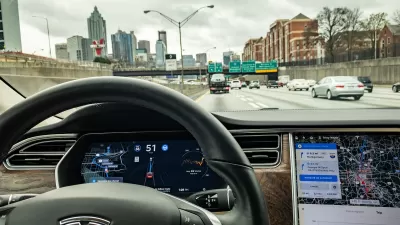Thousands of leaked safety complaints about the electric carmaker reveal a pervasive effort to hide problems from the public and prevent customers from filing lawsuits.

A data leak containing thousands of internal Tesla documents outlining safety complaints with the company’s automated driving technology shows that problems may be more widespread than previously thought, according to an article by Russ Mitchell in the Los Angeles Times.
The leaked files “spotlight Tesla’s attempts to keep safety complaints secret and what appears to be a strategy to limit customer communications that might end up in lawsuits,” Mitchell writes, highlighting four key points from the first article published about the leak in the German newspaper Handelsblatt. The documents, which include thousands of customers complaints about Tesla vehicles, reveal a systematic effort to avoid communicating with customers in writing, with the company advising employees explicitly, “Do not copy and paste the report below into an email, text message, or leave it in a voicemail to the customer.”
Tesla has also historically tried to prevent customers from publicizing their complaints. “As far back as 2016, the National Highway Traffic Safety Administration had to announce that customers were allowed to publicize safety issues after reports that Tesla was requiring customers to sign nondisclosure agreements to qualify for warranty repairs on problematic Model S suspension systems.”
The leaked documents could become evidence in lawsuits against the company “and could prompt state and federal regulators to finally take action,” says Mitchell. Tesla is already under investigation by the federal government and came under fire in California for using the term “Full Self-Driving,” which can be misleading to consumers.
FULL STORY: Huge Tesla data leak reportedly reveals thousands of safety complaints. 4 things to know

Manufactured Crisis: Losing the Nation’s Largest Source of Unsubsidized Affordable Housing
Manufactured housing communities have long been an affordable housing option for millions of people living in the U.S., but that affordability is disappearing rapidly. How did we get here?

Americans May Be Stuck — But Why?
Americans are moving a lot less than they once did, and that is a problem. While Yoni Applebaum, in his highly-publicized article Stuck, gets the reasons badly wrong, it's still important to ask: why are we moving so much less than before?

Using Old Oil and Gas Wells for Green Energy Storage
Penn State researchers have found that repurposing abandoned oil and gas wells for geothermal-assisted compressed-air energy storage can boost efficiency, reduce environmental risks, and support clean energy and job transitions.

Greening Oakland’s School Grounds
With help from community partners like the Trust for Public Land, Oakland Unified School District is turning barren, asphalt-covered schoolyards into vibrant, green spaces that support outdoor learning, play, and student well-being.

California Governor Suspends CEQA Reviews for Utilities in Fire Areas
Utility restoration efforts in areas affected by the January wildfires in Los Angeles will be exempt from environmental regulations to speed up the rebuilding of essential infrastructure.

Native American Communities Prepare to Lead on Environmental Stewardship
In the face of federal threats to public lands and conservation efforts, indigenous groups continue to model nature-centered conservation efforts.
Urban Design for Planners 1: Software Tools
This six-course series explores essential urban design concepts using open source software and equips planners with the tools they need to participate fully in the urban design process.
Planning for Universal Design
Learn the tools for implementing Universal Design in planning regulations.
Heyer Gruel & Associates PA
City of Moreno Valley
Institute for Housing and Urban Development Studies (IHS)
City of Grandview
Harvard GSD Executive Education
Salt Lake City
NYU Wagner Graduate School of Public Service
City of Cambridge, Maryland





























